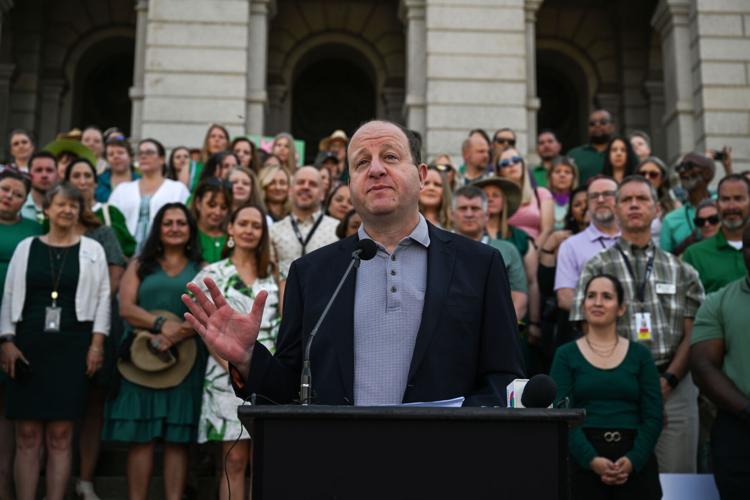Gov. Jared Polis imposes hiring freeze as Colorado lawmakers prepare to cut $800M from budget

Colorado Gov. Jared Polis addresses a crowd during a press conference celebrating the launch of the Colorado LIFTS (Linking Individuals and Families to Services) Network on Wednesday, July 9, 2025. LIFTS is the state’s new network on mental health, substance use and crisis support for uninsured and underinsured people. (Stephen Swofford, Denver Gazette)
Stephen Swofford
Gov. Jared Polis will convene the legislature on Aug. 21 to enact cuts to the state budget amid a $783 million shortfall, even as he is instituting a hiring freeze.
The governor said in a Wednesday news conference that the hiring freeze in state agencies will start on Aug. 27 and continue through the end of the year, saving about $3 million.
The freeze does not include employees funded through Taxpayer’s Bill of Rights-exempt funding sources, firefighters, corrections employees or other state employees involved in 24/7 operations, the governor said, adding it will help avoid furloughs and layoffs.
That’s on top of a request to state agencies to cut 2.5% of their operating expenses for 2026-27, although Mark Ferrandino, the governor’s budget director, said the administration is looking for what can be moved into the current year’s budget.
The amount of the cut has come down by about $170 million in the past week, when it was estimated at about $955 million.
Ferrandino explained that there was some benefit from H.R. 1, the federal budget bill, to the state education fund of about $130 million, plus a $40 million tax benefit to Proposition 123, the state affordable housing fund.
The impact of H.R. 1 was immediate, given that state tax policy in some areas mirrors that of the federal government. The majority of the shortfall comes from corporate tax changes contained in H.R. 1, Polis explained.
The governor, along with Democrats, have pointed to the federal tax policy changes as the “sole” reason behind Colorado’s current deficit. Republicans, on the other hand, have argued that legislators knew a large deficit was coming and still decided to grow government spending.
The total amount of the revenue deficit is about $1.2 billion, according to state economists and the governor’s budget office. Some of that will be covered by a surplus that existed at the end of the 2024-25 budget year.
Polis said it’s better to bring lawmakers back now to deal with the shortfall, as it will allow state agencies to absorb cuts over a 10-month period, rather than waiting until February, when the normal budget adjustments are made.
Ferrandino, the governor’s budget guru, has pointed out that waiting until next year will mean that, for every dollar saved, the state would have to cut three dollars because of the shortened timeframe.
The intention is to have the cuts in place by Sept. 1, Polis said.
The governor and legislative leaders promised no cuts to education funding. They also vowed to inoculate public safety from reductions.
The governor confirmed that, in addition to spending reductions, the special session will deal with AI regulation. Lawmakers had approved those regulations last year. They will go into effect on Feb. 1, 2026.
The AI law established rules around the use of artificial intelligence, primarily in employment, health care, education, and government practices, where, backers said, the risk of bias or discrimination exists. Businesses have argued that the new law is problematic, potentially penalizing mom-and-pop end users of the technology, instead of the big companies that created the AI software.
The special session will also look at reinsurance, support for Planned Parenthood and a change to the November ballot measure on school meals.
The cost just to state agencies as a result of Senate Bill 24-205, the new AI law, stands at about $5 million, Polis said on Wednesday.
Policymakers’ main challenge in the Aug. 21 session will be instituting cuts totaling $783 million in general funds.
Polis, House Speaker Julie McCluskie and Senate President James Coleman insisted that the legislature approved — and the governor signed — a balanced budget earlier this year, which the congressional budget undid.
“This is mathematics, not politics,” Polis said in a separate interview. “Not only was the budget in balance without H.R. 1, we had a TABOR surplus, and every taxpayer would have gotten a refund.”
Joint Budget Committee Chair Sen. Jeff Bridges, D-Greenwood Village, noted the state had a balanced budget on July 1, and, “on July 4, we were down a billion. “
“First, we cut $1.2 billion because of TABOR. Now, we’re cutting $1.2 billion because of Trump. Like Yogi Berra said, it’s déjà vu all over again,” he said.
JBC Vice Chair Rep. Shannon Bird, D-Westminster, echoed that sentiment.
“I am deeply concerned by the pain the federal budget will inflict on vulnerable people and the increased costs on families. We are committed to finding responsible solutions, but this billion dollar hole in our state budget will require difficult decisions,” she said.
Coleman said lawmakers “will do everything we can to minimize the harm, but there’s no avoiding the fact that these cuts threaten core services and will hurt Colorado families.”
“I want every Coloradan to know that we’re fighting for them, listening to experts, and working to maximize every dollar, unlike Congressional Republicans who have handed out tax breaks to the wealthy at the expense of our most vulnerable,” he said.
McCluskie said H.R. 1, which ends tax credits for people who buy individual insurance through the state health insurance exchange, will kick Coloradans out of their health plans. The state Division of Insurance has said health insurance premiums for those covered in the individual market will increase on average by 28%, with rural communities expected to see increases of up to 38%.
“All Coloradans are now the collateral damage from the GOP’s cruel bill, which will jeopardize services for hardworking families, children, veterans and older Coloradans,” she said.
House Republicans criticized the special session as a waste of taxpayer money and argued that Colorado’s budget deficit is “self-inflicted.”
House Minority Leader Rose Pugliese of Colorado Springs said Polis “is using a special session to stir fear about the Big Beautiful Bill, when the truth is that the Big Beautiful Bill continues to cover the people it was designed to serve: seniors, single mothers, children, and people with disabilities.”
Assistant Minority Leader Ty Winter of Trinidad also criticized the special session’s timing, noting it convenes the day before the start of the Colorado State Fair. He argued the governor disregarded rural Colorado anew.
“The State Fair is a time for rural communities to come together and celebrate their contributions; feeding our state, powering our economy, and showcasing Colorado values,” Winter said. “It is also a moment for the good people of rural Colorado to proudly share the results of their hard work with the entire state. Calling a special session during this time shows just how out of touch the governor is with the people who do God’s work on God’s land.”
Republicans have insisted that the budget deficit is the result of the Democratic-led legislature’s own actions, arguing the state built unsustainable programs with one-time federal dollars, instead of setting priorities for core services, such as Medicaid for seniors, single moms, children and people with disabilities.
“The Democrats’ obsessive and irresponsible spending has forced this legislature to operate under a structural deficit for years. This crisis is entirely self-inflicted, not because of H.R.1, but because of the Democrats’ mismatched priorities,” Senate Minority Leader Sen. Cleave Simpson, R-Alamosa, earlier said.






